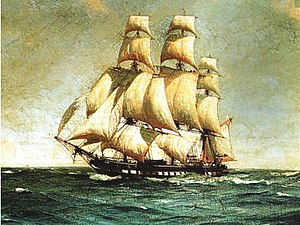French frigate Lutine (1779)

|
|
| History | |
|---|---|
|
|
|
| Name: | Lutine |
| Namesake: | Lutine is the feminine form of Lutin. |
| Ordered: | 23 October 1778 |
| Builder: | Toulon shipyard |
| Laid down: | March 1779 |
| Launched: | 11 September 1779 |
| Commissioned: | November 1779 |
| Captured: | August 1793 |
|
|
|
| Name: | HMS Lutine |
| Acquired: | August 1793 |
| Fate: | Lost in storm, 9 October 1799 |
| General characteristics | |
| Class and type: | Magicienne-class frigate |
| Displacement: |
|
| Length: | 44.2 m (145 ft) |
| Beam: | 11.2 m (37 ft) |
| Draught: | 5.2 m (17 ft) (22 French feet) |
| Sail plan: | Full-rigged ship |
| Armament: |
|
Lutine was a frigate which served in both the French Navy and the Royal Navy. She was launched by the French in 1779. The ship passed to British control in 1793 and was taken into service as HMS Lutine. She sank among the West Frisian Islands during a storm in 1799.
She was built as a French Magicienne-class frigate with 32 guns, and was launched at Toulon in 1779. During the French Revolution, Lutine came under French Royalist control. On 18 December 1793, she was one of sixteen ships handed over to a British fleet at the end of the Siege of Toulon, to prevent her being captured by the French Republicans. In 1795, she was rebuilt by the British as a fifth-rate frigate with 38 guns. She served thereafter in the North Sea, where she was part of the blockade of Amsterdam.
Lutine sank during a storm at Vlieland in the West Frisian Islands on 9 October 1799, whilst carrying a large shipment of gold. Shifting sandbanks disrupted salvage attempts, and the majority of the cargo has never been recovered. Lloyd's of London has preserved her salvaged bell – the Lutine Bell – which is now used for ceremonial purposes at their headquarters in London.
On 27 September 1793, the royalists in Toulon delivered the city, naval dockyards, arsenal, and French Mediterranean fleet to a British fleet commanded by Vice Admiral Lord Hood. The French vessels included:
...
Wikipedia
